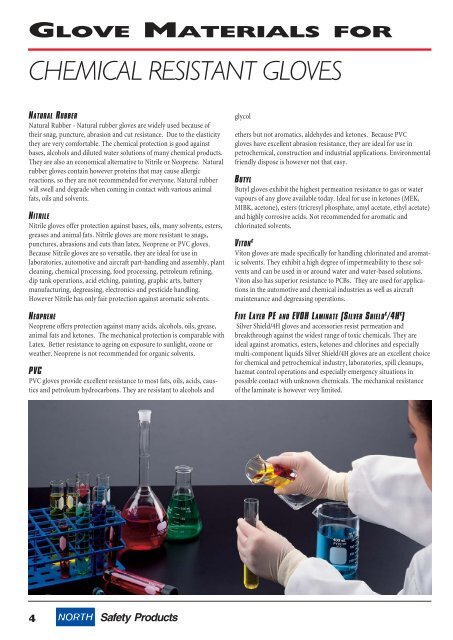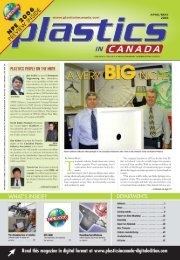nitril drybox gloves - LinkPath
nitril drybox gloves - LinkPath
nitril drybox gloves - LinkPath
Create successful ePaper yourself
Turn your PDF publications into a flip-book with our unique Google optimized e-Paper software.
GLOVE MATERIALS FOR<br />
CHEMICAL RESISTANT GLOVES<br />
NATURAL RUBBER<br />
Natural Rubber - Natural rubber <strong>gloves</strong> are widely used because of<br />
their snag, puncture, abrasion and cut resistance. Due to the elasticity<br />
they are very comfortable. The chemical protection is good against<br />
bases, alcohols and diluted water solutions of many chemical products.<br />
They are also an economical alternative to Nitrile or Neoprene. Natural<br />
rubber <strong>gloves</strong> contain however proteins that may cause allergic<br />
reactions, so they are not recommended for everyone. Natural rubber<br />
will swell and degrade when coming in contact with various animal<br />
fats, oils and solvents.<br />
NITRILE<br />
Nitrile <strong>gloves</strong> offer protection against bases, oils, many solvents, esters,<br />
greases and animal fats. Nitrile <strong>gloves</strong> are more resistant to snags,<br />
punctures, abrasions and cuts than latex, Neoprene or PVC <strong>gloves</strong>.<br />
Because Nitrile <strong>gloves</strong> are so versatile, they are ideal for use in<br />
laboratories, automotive and aircraft part-handling and assembly, plant<br />
cleaning, chemical processing, food processing, petroleum refining,<br />
dip tank operations, acid etching, painting, graphic arts, battery<br />
manufacturing, degreasing, electronics and pesticide handling.<br />
However Nitrile has only fair protection against aromatic solvents.<br />
NEOPRENE<br />
Neoprene offers protection against many acids, alcohols, oils, grease,<br />
animal fats and ketones. The mechanical protection is comparable with<br />
Latex. Better resistance to ageing on exposure to sunlight, ozone or<br />
weather. Neoprene is not recommended for organic solvents.<br />
PVC<br />
PVC <strong>gloves</strong> provide excellent resistance to most fats, oils, acids, caustics<br />
and petroleum hydrocarbons. They are resistant to alcohols and<br />
glycol<br />
ethers but not aromatics, aldehydes and ketones. Because PVC<br />
<strong>gloves</strong> have excellent abrasion resistance, they are ideal for use in<br />
petrochemical, construction and industrial applications. Environmental<br />
friendly dispose is however not that easy.<br />
BUTYL<br />
Butyl <strong>gloves</strong> exhibit the highest permeation resistance to gas or water<br />
vapours of any glove available today. Ideal for use in ketones (MEK,<br />
MIBK, acetone), esters (tricresyl phosphate, amyl acetate, ethyl acetate)<br />
and highly corrosive acids. Not recommended for aromatic and<br />
chlorinated solvents.<br />
VITON ¤<br />
Viton <strong>gloves</strong> are made specifically for handling chlorinated and aromatic<br />
solvents. They exhibit a high degree of impermeability to these solvents<br />
and can be used in or around water and water-based solutions.<br />
Viton also has superior resistance to PCBs. They are used for applications<br />
in the automotive and chemical industries as well as aircraft<br />
maintenance and degreasing operations.<br />
FIVE LAYER PE AND EVOH LAMINATE (SILVER SHIELD ¤ /4H ¤ )<br />
Silver Shield/4H <strong>gloves</strong> and accessories resist permeation and<br />
breakthrough against the widest range of toxic chemicals. They are<br />
ideal against aromatics, esters, ketones and chlorines and especially<br />
multi-component liquids Silver Shield/4H <strong>gloves</strong> are an excellent choice<br />
for chemical and petrochemical industry, laboratories, spill cleanups,<br />
hazmat control operations and especially emergency situations in<br />
possible contact with unknown chemicals. The mechanical resistance<br />
of the laminate is however very limited.<br />
4







